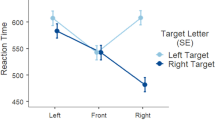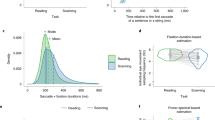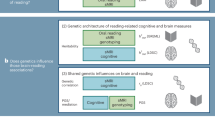Abstract
FREQUENTLY when an Israeli provides travel information in Hebrew, he points in one direction while simultaneously naming its opposite, for example he points to the left while saying: “You must turn right”. When this contradictory behaviour is brought to his attention, he excuses himself and either points in the direction he had verbally indicated or corrects his error by changing the verbal expression to correspond with the physical. Observation of such verbal–spatial dissociation prompted the following experiments to explore systematically the possibility that Israelis make more errors in response to questions relating to left–right orientation than do non-Israelis.
This is a preview of subscription content, access via your institution
Access options
Subscribe to this journal
Receive 51 print issues and online access
$199.00 per year
only $3.90 per issue
Buy this article
- Purchase on Springer Link
- Instant access to full article PDF
Prices may be subject to local taxes which are calculated during checkout
Similar content being viewed by others
References
Kinsbourne, M., Acta Psychol., 33, 193–201 (1970); Science, 176, 539–541 (1972); Neuropsychology, 12, 279–281 (1974).
Sherrington, C., Integrative Action of the Nervous System (Yale University Press, New Haven, 1906).
Author information
Authors and Affiliations
Rights and permissions
About this article
Cite this article
ALBERT, M. Cerebral dominance and reading habits. Nature 256, 403–404 (1975). https://doi.org/10.1038/256403a0
Received:
Accepted:
Issue Date:
DOI: https://doi.org/10.1038/256403a0
This article is cited by
-
Language and literacy in the context of brain, cognition, and culture
Journal of Cultural Cognitive Science (2017)
Comments
By submitting a comment you agree to abide by our Terms and Community Guidelines. If you find something abusive or that does not comply with our terms or guidelines please flag it as inappropriate.



